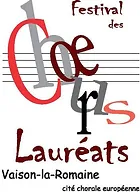CONCERTS
TAIWAN TOUR
FRANCE TOUR
Conservatorium of Music and Balet Ljubljana Chamber Choir led by Ambrož Čopi consists of about 40 singers who are willing to improve their vocal technique, to sing a more demanding range of choral music and to reach higher performing standards. The choir regulary colaborates with vocal educators Edita Garčević Koželj and Tatjana Vasle. The KGBL Chamber Choir embraces a wide range of music genres and styles, from the Renaissance to modern music. In the past years the choir had commissioned many prominent composers, such as Lojze Lebič, Tadeja Vulc, Damijan Močnik, Črt Sojar-Voglar, Peter Šavli, Andrej Makor, Tine Bec, Matej Kastelic, Klara Mlakar, Jan Triler and Federica Lo Pinto to create new compositions, which the choir successfully promotes at concerts and competitions in Slovenia and abroad. KGBL Chamber Choir is one of the most imortant promoters of young Slovene composers geneartion.
Artistic Leader and Conductor
Ambrož Čopi is a composer, conductor, teacher, music motivator and organizer.
Already as a young teacher he would encourage his students to create choral music and in time, he became the mentor of Slovenia’s youngest generation of composers.
His original works, recorded on five CDs, regularly appear on stages around the world. Čopi has led many a Slovene choir and achieved enviable results at home competitions (15 gold plaques) and internationally (26 first places).
Currently, he conducts the KGBL Chamber Choir and University of Pirmorska Mixed Academic Choir, both ranking among the top Slovenian choir ensembles. For exceptional achievements in music, he has received highest national awards.



















